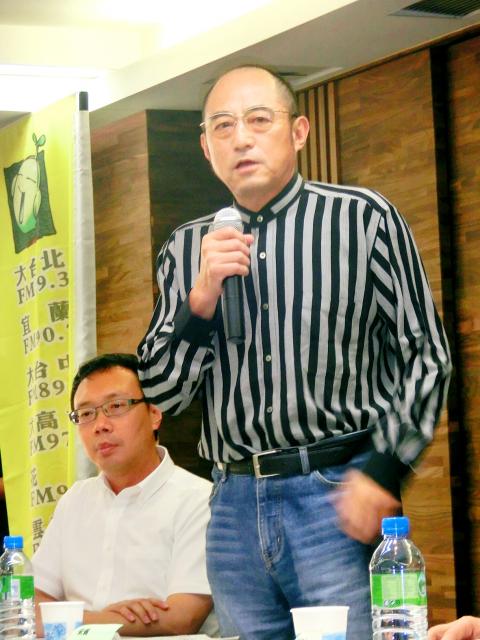A Chinese dissident yesterday warned the Democratic Progressive Party (DPP) over a planned shift in position on its China policy and said former premier Frank Hsieh (謝長廷) would lead the party down a path of “political suicide” in his similar attempts to shift plans.
“Beijing has two grand strategies for its absorption of Taiwan. First, economic integration goes before political integration. Second, making the Chinese Nationalist Party [KMT] another Chinese Communist Party [CCP] and the DPP another KMT,” Yuan Hongbing (袁紅冰) told a forum hosted by Beanstalk, a group founded by former secretary-general of the Presidential Office Chen Shih-meng (陳師孟).
Yuan, a Chinese writer who sought political asylum in Australia in 2004, has written two books in which he detailed his views on Taiwanese politics and Beijing’s maneuvers to unify Taiwan.

Photo: Li Hsin-fang, Taipei Times
The 59-year-old said that the first part of the grand scheme had been accomplished as the “second generation,” and the families of KMT politicians, have enjoyed business success in China in collaboration with the CCP.
Hsieh’s visit to China earlier last month, which had been described as an “ice-breaking” effort to better understand China and which sparked intra-party discussion to remove the clauses on Taiwan independence from its party chapter, would be the end of the DPP, he said.
“Because that suggests the DPP has betrayed its founding spirit and Taiwanese collective consciousness and wish for a new country,” Yuan added.
Chen said Hsieh’s visit, its arrangement, “his conduct during the visit as well as the content of his initiative of ‘constitutions with different interpretations’ (憲法各表)” lacked legitimacy.
While Hsieh said that he visited China in a private capacity and did not represent the DPP, Chen said Hsieh failed to realize that he was allowed to go because of his position as member of the DPP’s Central Standing Committee and the leader of a DPP faction.
Hsieh submitted his proposal without the authorization of the DPP and violated the party’s 1999 resolution on Taiwan’s future, Chen said, adding that Hsieh’s initiative “has gone beyond the KMT’s initiative of ‘one China with different interpretations’ (一中各表), which could be dangerous.”
“The KMT’s initiative involved different opinions across the Taiwan Strait about the title of the country, but Hsieh’s proposal has brought territorial claims, written in both the People’s Republic of China Constitution and the Republic of China Constitution, into the discussion,” Chen said.
In response to the issue of Hsieh’s initiative, Joseph Wu (吳釗燮), executive director of the DPP’s Policy Research Committee, said he regarded the constitutional spirit as more important than the actual text of the Constitution.
“In other words, the Constitution cannot be taken away from the people it actually covers,” Wu said, adding that he only spoke for himself and did not represent the DPP’s official position.
However, Wu said, the DPP would never accept the “one China principle,” which the party viewed as Beijing’s first step in a five-stage plan of unifying Taiwan and China — and everything related to the principle.
The remaining four steps would be ending the hostility, signing a peace agreement, the establishment of a military confidence-building mechanism and political arrangement toward eventual unification, Wu said.
Separately yesterday, Taiwan Solidarity Union (TSU) Chairman Huang Kun-huei (黃昆輝) also addressed Hsieh’s visit on the sidelines of a TSU party event in Chiayi County.
Huang said that while former DPP chairperson Tsai Ing-wen (蔡英文) also encouraged bilateral engagement between the DPP and Beijing, it would “take more than a number of trips by some politicians to better understand China.”

Taiwan is to commence mass production of the Tien Kung (天弓, “Sky Bow”) III, IV and V missiles by the second quarter of this year if the legislature approves the government’s NT$1.25 trillion (US$39.78 billion) special defense budget, an official said yesterday. Commenting on condition of anonymity, a defense official with knowledge of the matter said that the advanced systems are expected to provide crucial capabilities against ballistic and cruise missiles for the proposed “T-Dome,” an advanced, multi-layered air defense network. The Tien Kung III is an air defense missile with a maximum interception altitude of 35km. The Tien Kung IV and V

The disruption of 941 flights in and out of Taiwan due to China’s large-scale military exercises was no accident, but rather the result of a “quasi-blockade” used to simulate creating the air and sea routes needed for an amphibious landing, a military expert said. The disruptions occurred on Tuesday and lasted about 10 hours as China conducted live-fire drills in the Taiwan Strait. The Civil Aviation Administration (CAA) said the exercises affected 857 international flights and 84 domestic flights, affecting more than 100,000 travelers. Su Tzu-yun (蘇紫雲), a research fellow at the government-sponsored Institute for National Defense and Security Research, said the air

A strong continental cold air mass is to bring pollutants to Taiwan from tomorrow, the Ministry of Environment said today, as it issued an “orange” air quality alert for most of the country. All of Taiwan except for Hualien and Taitung counties is to be under an “orange” air quality alert tomorrow, indicating air quality that is unhealthy for sensitive groups. In China, areas from Shandong to Shanghai have been enveloped in haze since Saturday, the ministry said in a news release. Yesterday, hourly concentrations of PM2.5 in these areas ranged from 65 to 160 micrograms per cubic meter (mg/m³), and pollutants were

Taiwan’s armed forces have established response protocols for a wide range of sudden contingencies, including the “Wan Chun Plan” to protect the head of state, the Ministry of Defense (MND) said today. After US President Donald Trump on Saturday launched a series of airstrikes in Venezuela and kidnapped Venezuelan President Nicolas Maduro, concerns have been raised as to whether China would launch a similar “decapitation strike” on Taiwan. The armed forces regularly coordinate with relevant agencies and practice drills to ensure preparedness for a wide range of scenarios, Vice Minister of National Defense Hsu Szu-chien (徐斯儉) told reporters before a